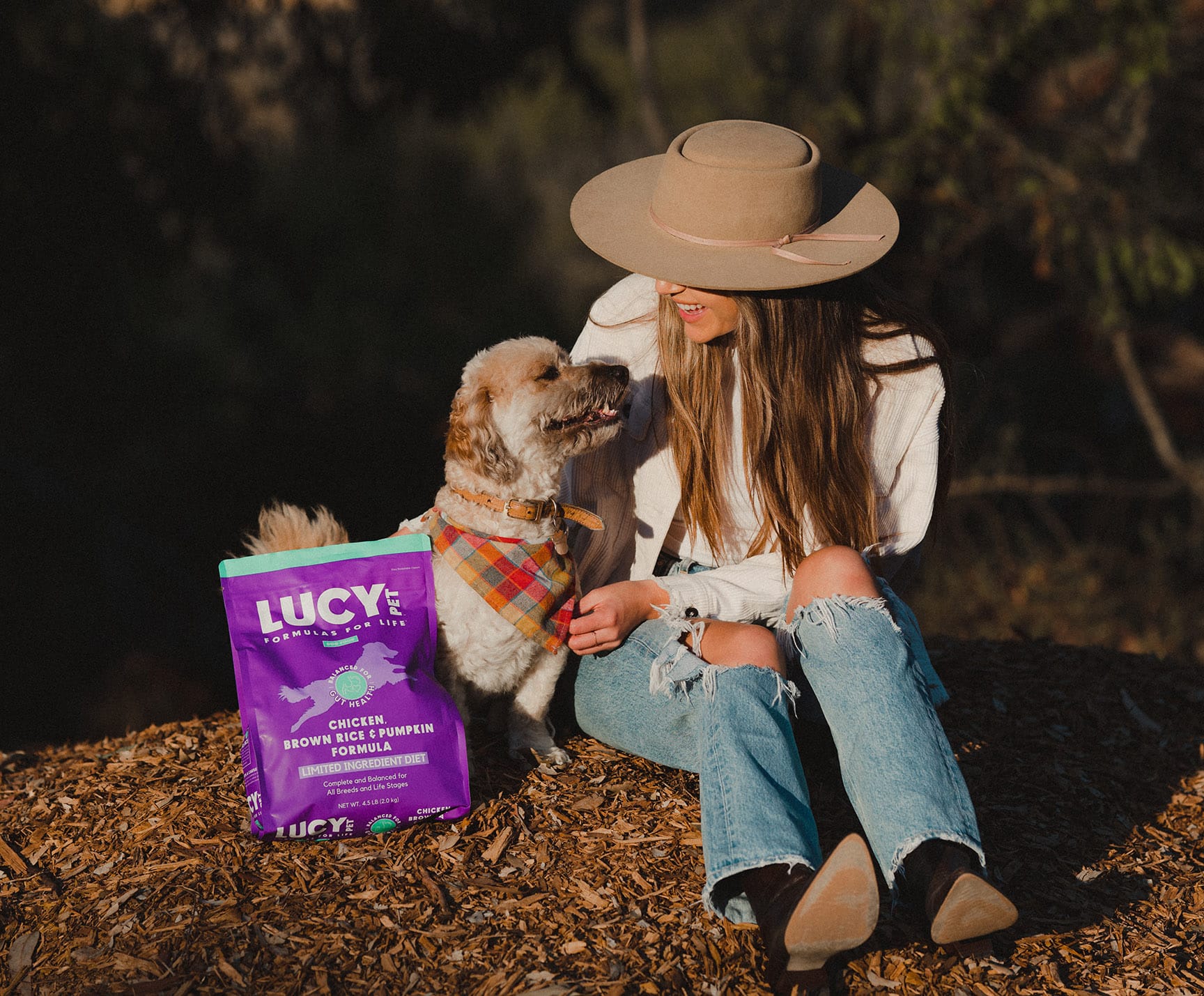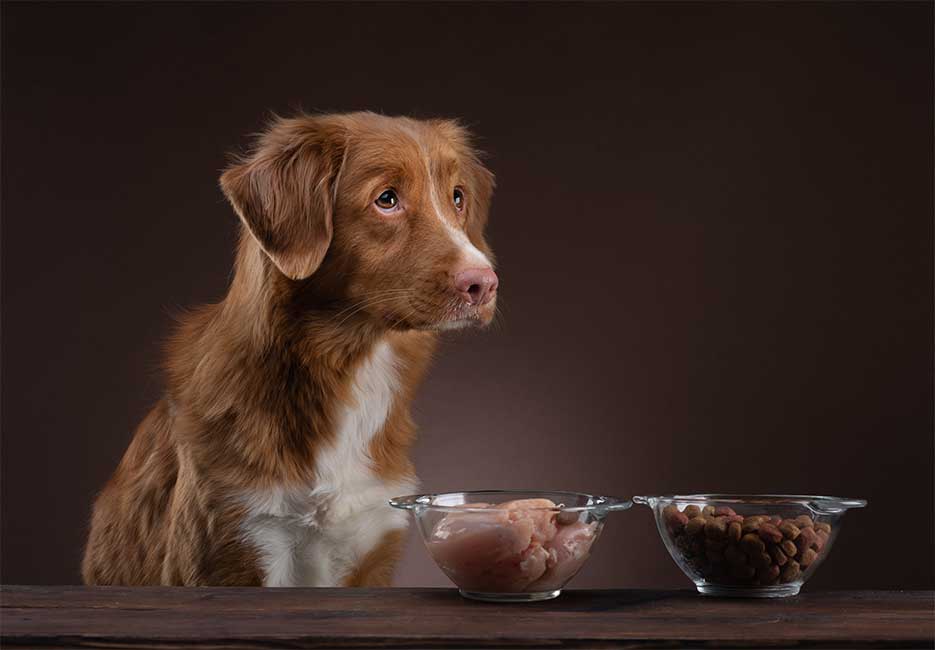
7 Most Common Dog Digestive Issues
Just like humans, dogs also need to eat a nutritious and balanced diet. In fact, a balanced diet is essential for dogs to live long, healthy lives.
With the right combination of vitamins, minerals, proteins, and complex carbohydrates, our dogs can enjoy a more robust immune system, a shinier coat, more energy, and a whole host of other essential health benefits.
While many people may think they can treat their dogs like garbage disposals, offering all sorts of treats, table scraps, and other foods, this is a bad idea, because it can quickly and easily lead to serious digestive stomach issues.
Many well-meaning owners don’t even realize that the poor nutrition choices they’ve made for these dogs are the reason their dog exhibits regular stomach problems, including symptoms like nausea, vomiting, diarrhea, or other more pressing concerns.
In some cases, the pain and discomfort associated with digestive issues can even prevent dogs from eating altogether, which only causes their health to deteriorate further.
Diagnosing and treating a dog’s digestive problems must be handled with great care, but also urgency, as failing to seek medical assistance will only increase the severity of symptoms and prolong the dog’s suffering.
This article explains how to identify and deal with 7 of the most common stomach issues in dogs, giving you all the information you need to provide your dog with healthy, safe, and supportive nutrition.
Symptoms of Stomach Problems in Dogs
One moment your dog is gleefully gallivanting around the dog park, and the next, he is sluggish, irritable, and not himself.
The moment you notice a difference in behavior, it’s crucial that you take inventory of what symptoms your dog is exhibiting, think about what they could signal, and start dealing with what could become a much more significant problem if you were to simply ignore it.
What are the surefire ways to tell that your dog’s change in demeanor has to do with a compromised digestive system in dogs?
Below are some of the most common signs of dog digestive issues:
- Excessive gas (rumbling stomach, burping, etc.)
- Nausea
- Vomiting
- Diarrhea
- Weight Loss (usually caused by excessive vomiting and diarrhea)
- Constipation
- Disinterest in pet food
Unfortunately, the above-listed symptoms could indicate either an ailment that is non-threatening or they could signal that you need to take immediate action because your dog is in grave danger. This is why we always suggest consulting with your veterinarian as soon as you notice something is off.
However, if your dog is experiencing any of the below, then you absolutely MUST seek medical attention immediately as you could be facing a life-threatening emergency:
- Excessive shaking or panting
- Severe dehydration
- Dry heaving
- Vomiting liquids
Causes of Digestive Problems in Dogs
While dogs are incredibly resilient, even a small amount of certain foods that are completely safe for humans (like grapes, chocolate, or garlic) can disrupt a dog’s immune and digestive health. Many dog owners aren’t even aware that only some vegetables are safe for dogs!
Some digestive issue causes are benign and require little more than home treatment; however, specific instances require a veterinarian’s diagnosis and treatment.
Knowing the distinction is crucial to helping your dog heal, and, in some instances, saving your dog’s life.
Here are several common causes of dog digestive disorders that you should keep in mind while assessing your pet’s stomach issue:
- Bacteria (pathogenic)
- Viruses
- Parasites
- Worms
- Abrupt change in your dog’s diet
- Excessive consumption of grass (non-life threatening)
- Consuming chocolate (potentially life-threatening)
- Bloat (a severe, life-threatening condition that requires immediate attention)
Seven Most Common Dog Digestive Issues
The number of dog digestive issues that can arise is extensive. From diarrhea to toxicity or poisoning, knowing the nuances of your dog’s health and behavior is the key to ensuring a happy and healthy life.
Below you’ll find seven dog stomach problems we feel you need to know about, as well as details about their most common symptoms.
Issue #1: Vomiting
If there are any guarantees in your experience as a dog owner, you can be certain that one day you’ll be confronted by your dog vomiting.
This is one of the most common digestive ailments in dogs, and more often than not, the root cause is relatively benign. Sometimes a dog will vomit and then continue frolicking in the yard as if nothing ever happened!
Yet, vomiting can also be an indicator of something more serious. According to the American Kennel Club’s article “Dog Vomiting: Causes, Diagnosis, and Treatment,” your dog is (probably) fine if he vomits once, but if he vomits multiple times in conjunction with any of the below symptoms, then there’s likely a more serious ailment afoot:
- Repeated vomiting
- Vomiting a large amount
- Vomiting up blood
- Diarrhea containing blood
- Seizures
Vomiting can indicate a wide variety of conditions or illnesses, ranging from heat stroke to liver failure. Most conditions are curable, especially if you seek medical attention as soon as something seems amiss.
Issue #2: Diarrhea
With an insatiable curiosity for the contents of any trashcan and a mysterious passion for gnawing on grass, diarrhea is an inevitable occurrence in any dog’s lifetime.
Similar to vomiting, diarrhea is not necessarily always a cause for concern. To determine the severity of your dog’s bowel irregularity, first, you must become acquainted with the four C’s of dog poop. According to Certa Pet, these are:
- Color – Your dog’s stool should have a rich brown hue.
- Coating – There should not be any sort of mucus-like coating on your dog’s stool.
- Contents – The contents of your dog’s stool should appear well-digested and processed. Occasionally, food matters such as vegetables will appear, and this is perfectly healthy. However, if you see white, string-like material, this indicates the presence of worms.
- Consistency – Your dog’s stool should be firm enough to remain intact, but also slightly soft to the touch.
Any deviation from the above could indicate the presence of dog digestion problems. Diarrhea can be characterized as a liquid-like, loose stool. While this is not an uncommon occurrence for many dogs, it’s important to know both how to treat one’s dog at home and how to determine when the situation at hand may be serious.
In the Whole Dog Journal article “Dog Diarrhea Causes and Remedies,” author Catherine Ashe states that:
“If your dog seems otherwise normal, and he is currently taking regular parasite preventative medications, then symptomatic treatment at home is appropriate. Usually, most diarrhea will run its course within two to four days, although in some cases, it can last longer. If there are any other signs of illness like vomiting, loss of appetite, depression, or pain, a veterinary trip is in order.”
Before escalating to a trip to the vet, many pet parents choose to administer an at-home treatment that is similar to the course of action for humans: a bland diet, access to fresh water, ample rest, and frequent walks.
In some cases, consumers also supplement with a quality, refrigerated probiotic to replenish a dog’s gut. However, if the symptoms persist for more than a few days and are accompanied by other atypical behaviors, it’s time to bring your ailing pooch to the vet.
Issue #3: Chocolate Toxicity
The bottom line is to keep all chocolate well out of reach of your dog. Much beloved by humans but lethal for their trusted canine companions, chocolate—cacao specifically—contains the bitter alkaloid Theobromine.
This alkaloid, along with the caffeine present in chocolate, is incredibly toxic for dogs. The amount of chocolate, as well as the type (dark chocolate is far more toxic than milk chocolate due to the higher concentration of cacao) your dog consumes, will determine the severity of their symptoms.
That said, a medical professional should always be consulted in the event of accidental chocolate consumption.
Symptoms of chocolate poisoning typically arise six to twelve hours after ingestion and can last up to 72 hours. According to VCA animal hospitals, signs that your dog has consumed chocolate vary but typically include at least one of the below:
- Vomiting
- Diarrhea
- Increased thirst
- Excessive urination
- Restlessness
- Panting
- A racing heart
- Seizures
- Heart Failure
The American Kennel Club’s guide “What to Do If Your Dog Eats Chocolate” states that the best methods of preventing your dog from consuming chocolate are:
- Put your chocolate away – This doesn’t mean merely hiding the chocolate from sight. Instead, AKC suggests that you “make sure all chocolate items, including cocoa powder and hot chocolate mix, are stored where the dog cannot reach them, such as on a high shelf in a closed-door pantry.”
- Leave it – Teaching your dog this command is not only simple but could—potentially—become the difference between life and death (for your canine).
- Crate training – The most surefire method of guaranteeing your dog will not break into your secret candy stash is to keep your dog in a crate when you are not watching him. According to AKB, the key to making your dog comfortable in his crate is to “offer toys, a stuffed Kong, a favorite blanket, and treats to help him feel like the crate is his den.
Issue #4: Worms
Worms are some of the most common dog digestive issues and the most terrifying for their human guardians. If you notice your dog’s coat has become dull, their stomach starts to resemble a pot belly, or simply that they’re low in energy and losing weight; you may be contending with worms.
According to Blue Cross for Pets (BCP), there are four predominant types of worms that afflict dogs:
Roundworms – Roundworm larvae typically begin their journey in a dog’s intestinal tract but can travel to other internal organs.
According to BCP, “[roundworms] are long, white and spaghetti-like in appearance and absorb nutrients from the infected dog.” Many puppies are born with roundworms; thus, it’s crucial to have your puppy examined.
- Hookworms – Hookworms are one of the more lethal types of worms, often causing death in puppies. These vampiric pests tend to be shorter worms and have teeth for sucking blood.
- Whipworms – Whipworms tend to be the most benign sort of parasite. They mostly dwell in the large intestine and produce few symptoms, if any.
- Tapeworms – According to BCP, tapeworms “live in the small intestine, grabbing onto its wall with six tiny rows of teeth to absorb nutrients as food is digested.” Despite the potential for horror movie stardom, tapeworms typically are not notably harmful to a dog’s health.
If you suspect that your dog has worms, it is crucial to visit the vet for diagnosis. Each type of worm has a course of treatment, so identifying which type of worms your dog may have is imperative.
Issue #5: IBD
Inflammatory Bowel Disease (henceforth IBD), is not unlike the human counterpart IBS (irritable bowel syndrome). IBD is a chronic condition, suggesting a wide array of symptoms that hint at underlying damage to the digestive tract and advanced inflammation of the intestinal tract.
According to Doctors of Veterinary Medicine Krista Williams and Ernest Ward in their article for VCA Hospitals:
Inflammatory bowel disease (IBD) is a syndrome rather than a disease. The syndrome is caused by a specific reaction to chronic irritation of the intestinal tract. Most dogs with IBD have a history of recurrent or chronic vomiting or diarrhea and may have a poor appetite. During periods of vomiting or diarrhea, the dog may lose weight but is normal otherwise.
While little is known about what causes IBD, through a multipart treatment of a healthy diet, medication, and vitamins, the soothing of discomfort is highly possible.
Issue #6: Gastritis
While vomiting is not an unusual occurrence in a dog’s life if vomiting occurs frequently and in conjunction with other symptoms, your pooch may be afflicted with gastritis.
An inflamed intestinal lining characterizes this condition, often accompanied by infection. Usually, this condition is caused by your dog eating food out of the garbage, ingesting toxins, or a viral infection. While gastritis is typically an acute ailment, this can also take the form of chronic disease.
According to the Banfield Pet Hospital, the typical signs of gastritis are:
- Vomiting
- Diarrhea
- Depression
- Fever
- Abdominal pain
- Decreased appetite and water intake
- Weakness
- Weight loss and other abnormalities
If not appropriately treated, gastritis can be fatal. This is certainly not one of the dog digestive issues to take lightly!
Issue #7: Pancreatitis
Last but not least, pancreatitis is considered to be one of the most threatening dog digestive problems, one that absolutely threatens the health of your best friend.
The pancreas is an important organ in the digestive process, releasing digestive enzymes that assist in the breakdown of food and other essential functions when “digestibles” meet the small intestine.
In the event of pancreatitis, the pancreas releases enzymes that become activated immediately upon release, destroying the pancreas itself. This condition can be incredibly painful and life-threatening for dogs.
You notice your dog is unwell, but how do you know if pancreatitis is the culprit? According to Whole Dog Journals’ article “Canine Pancreatitis,” a few telltale signs are:
- Persistent vomiting
- Weakness
- Disinterest in food
- Abdominal pain
- Walking with an arched back
- Lying in a corner refusing to move
Treatment varies from administering intravenous fluids to hospitalization and even surgery. It’s of the utmost importance to pay close attention to the onset of any of the above symptoms and act as swiftly as possible if pancreatitis is a possibility. While being of the more serious dog digestive problems, luckily, it’s highly treatable if caught in time.
Monitoring Your Dog
Now that you’re aware of the 7 most common dog digestive issues, you must remain alert for warning signs and continue to monitor your pup.
By taking the proper precautions, you help your dog live a long and happy life.
Dog Digestive FAQs
For more information regarding dog digestive issues, please refer to the FAQs below.
If your dog is experiencing any of the negative symptoms discussed above, please seek immediate medical assistance from your veterinarian as soon as possible.
How Do You Know If Your Dog Has Digestive Problems?
Digestive problems in dogs are easy to spot once you know what to look for.
Symptoms such as diarrhea, vomiting, and bloating are easily identifiable and are indicative of an upset stomach.
In most cases, these symptoms are fleeting and will dissipate on their own; however, if these symptoms become regular occurrences, it’s important to seek medical assistance from your veterinarian to discover the root of the problem.
Other symptoms, such as constipation and stomach discomfort, can be harder to identify. In these cases, it’s important to observe your dog on their daily walks to see if they’re in any discomfort while handling their business.
Additionally, if your dog whines or cries when you rub their belly, it may be because of stomach discomfort, in which case, you’ll want to call your veterinarian.
What Can I Give My Dog For An Upset Stomach?
If your dog has an upset stomach, it may be a good idea to fast your dog for up to 24 hours. Although it seems cruel, this will give your dog a chance to empty his or her stomach, which in many cases, will alleviate any excessive bloating or stomach discomfort.
While your dog is fasting, make sure fresh water is always available.
Once the fast is over, feed your dog, a bland diet consisting of unseasoned chicken breast and brown or white rice. If your dog responds positively to this diet and shows no signs of digestive problems, continue feeding this diet for an additional 4-5 days.
At the end of the 5 days, begin mixing their regular food into the chicken and rice and see how they react. If your dog appears to accept the food without issue, slowly integrate more of their regular food until the chicken and rice are phased out entirely.
How Do I Know If My Dog’s Stomach Hurts?
If your dog is refusing to eat, vomiting, eating grass, or whining during belly rubs, there’s a good chance he or she is experiencing stomach discomfort.
In these cases, it’s important to put your dog on a bland diet as soon as possible and to call your veterinarian.
How Long Does A Dog’s Upset Stomach Last?
Symptom duration depends on the severity of the cause: in many cases, digestive issues in dogs will resolve in as little as 1-2 days.
However, if the cause is more severe, symptoms can last much, much longer.
That’s why we recommend contacting your veterinarian once symptoms manifest so that your dog can receive the appropriate treatment as soon as possible.
What Is The Best Dog Food For Sensitive Stomachs?
If your dog has any kind of food sensitivities, sticking to a bland (chicken and rice) or limited ingredient diet can be highly beneficial.
Lucy Pet’s limited ingredient chicken, brown rice, and pumpkin dog food, and our duck and potato limited ingredient dog food formulas are an excellent choice for dogs with food sensitivities.
Our limited ingredient formulas are made with real meat as the first ingredient, they contain no meat by-products, and what’s more, they also contain healthy complex carbohydrates like brown rice and sweet potatoes.
Additionally, our limited ingredient formulas contain our special P.B.F Prebiotic Balanced Fiber blend that promotes gut and digestive health, helping to reduce digestive issues like those explained above.
Our P.B.F formulation is based on 40 years of research and studies by one of the top scientists in animal nutrition, Dr. George C Fahey. It contains a unique, high-quality mix of fiber sources like quinoa, flaxseed, and more!
Support Your Dog’s Digestion With Lucy Pet Formulas For Life™
Lucy Pet’s Formulas for Life™ dog food is precisely formulated to contain nutritious, all-natural ingredients delivering all the vitamins, minerals, and essential amino acids your best friend needs to thrive.
Lucy Pet also offers a variety of delicious, limited ingredient dog treats for training your pup how to perform tricks or heel.
So, make the switch today and treat your dog to Lucy Pet’s Formulas™ for Life dog food!
Sources
Sources
American Kennel Club: https://www.akc.org/expert-advice/health/what-to-do-if-your-dog-ate-chocolate/
US National Library of Health: https://www.ncbi.nlm.nih.gov/pmc/articles/PMC1215566/
Certa Pet, “Dog Diarrhea”: https://www.certapet.com/dog-diarrhea/
Merck Vet Manual: https://www.merckvetmanual.com/digestive-system
VCA Hospitals, “Inflammatory Bowel Disease in Dogs”: https://vcahospitals.com/know-your-pet/inflammatory-bowel-disease-in-dogs





Leave A Comment
You must be logged in to post a comment.